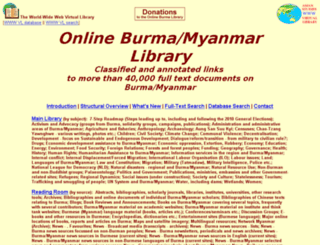Focal point
Location
The Online Burma/Myanmar Library (OBL) is a non-profit online research library mainly in English and Burmese serving academics, activists, diplomats, NGOs, CSOs, CBOs and other Burmese and international actors. It is also, of course, open to the general public. Though we provide lists of Burma/Myanmar news sources, the Library’s main content is not news but in-depth articles, reports, laws, videos and links to other websites, We provide a search engine (database and full text) and an alphabetical list of categories and sub-categories, but the Library is best accessed through browsing the 100 or so categories which lead to sub- and sub-sub categories. These tools should be used in combination.
Members:
Resources
Displaying 621 - 625 of 1151Community Forestry in Cease-Fire Zones in Kachin State, Northern Burma: Formalizing Collective Property in Contested Ethnic Areas
... Community forests (CF) in northern Burma, particularly in Kachin State, have been sprouting up in villages since the mid-2000s, spearheaded by national NGOs. The recent watershed of CF establishment follows several contingent foundational factors: greater political stability and government control in cease-fire zones; enhanced NGO capacity, access, and effectiveness in these areas; and most prominently the recent threat of agribusiness.
Status of Customary Land Rights in Burma (Myanmar)
30 pages for projection
Guidance Note on Land Issues (Myanmar)
This note is meant to serve as a quick reference for local authorities and NGOs to
acquire an understanding of relevant land laws and the context of land-use in
Myanmar. All land and all natural resources in Myanmar, above and below the ground,
above and beneath the water, and in the atmosphere is ultimately owned by the Union of
Myanmar. Although the socialist economic system was abolished in 1988, the existing Land
Law and Directions were not changed in parallel, and thus these are still in use today in
Guidance Note on Land Issues (Myanmar)
This note is meant to serve as a quick reference for local authorities and NGOs to
acquire an understanding of relevant land laws and the context of land-use in
Myanmar. All land and all natural resources in Myanmar, above and below the ground,
above and beneath the water, and in the atmosphere is ultimately owned by the Union of
Myanmar. Although the socialist economic system was abolished in 1988, the existing Land
Law and Directions were not changed in parallel, and thus these are still in use today in


